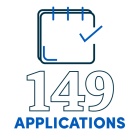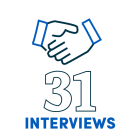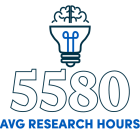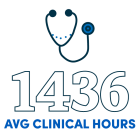Why Choose UB
As you consider the next steps in your career in medicine and research, the Jacobs School of Medicine and Biomedical Sciences stands out as an exceptional place to embark on this transformative journey.
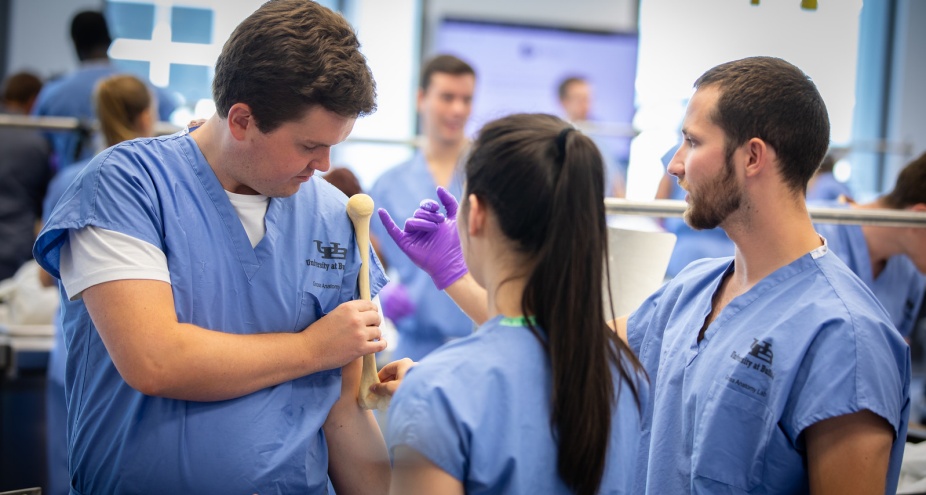
A Flagship Institution with a Global Reputation
The University at Buffalo is New York's flagship university and a proud member of the prestigious Association of American Universities (AAU).
As one of the nation's premier research universities, UB is committed to advancing its status among the Top 25 public research universities in the country, reflecting our dedication to impactful research, academic excellence, and societal contributions.
How It Works
Our program's structured curriculum and one-on-one advising give you the resources to succeed on your path to becoming a clinical translational scientist with an average program duration of seven to eight years.
- Clinical and didactic coursework alongside medical students
- Laboratory Rotations
- Bi-weekly MD-PhD Seminar
- Advanced basic science coursework
- PhD thesis research
- Longitudinal clinical mentoring program
- Bi-weekly MD-PhD Seminar
- Clinical rotations and electives
- Prepare for Residency or Post-Doc
- Bi-weekly MD-PhD Seminar
Experience Immersive Clinical Training
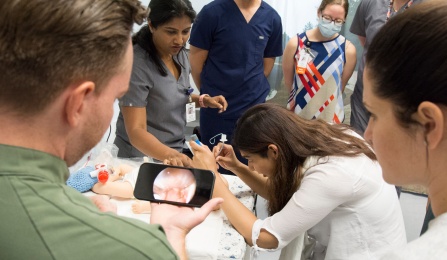
Our medical curriculum sets the stage for a gratifying career and lifelong learning.
Your clinical training begins right from Day 1 and continues through the PhD portion of your training with our Longitudinal Clinical Mentoring Program.
Academic Health Center
The University at Buffalo Academic Health Center brings together the talents of clinicians, educators, and researchers to provide superb research and educational environments to foster basic discovery in the biosciences, health-sciences translational research, preventive and interventional clinical trials, superb clinical care, and training of the next generation of health care practitioners in these disciplines.
Benefits
- We are distinct and one of only a few that include the full complement of health schools.
- We provide a unique environment by merging educational training, patient care, health-sciences translational research, and clinical trials.
- We are committed to collaboration with our centralized location in downtown Buffalo at the new home of the Jacobs School of Medicine and Biomedical Sciences.
Explore Broad Research Possibilities
Diverse research opportunities form the heart of our program.
Whether your calling is in the basic sciences, public health, engineering, or cancer sciences, we're sure you'll find your fit here.
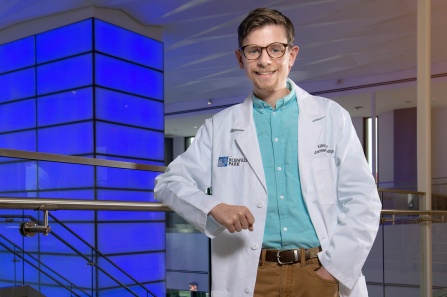
Pioneering Research Opportunities
Our commitment to health equity and cutting-edge research is unmatched. The Jacobs School received a $3.6 million award from the National Institute on Minority Health and Health Disparities to establish the Center of Excellence in Investigator Development and Community Engagement, as part of UB's Community Health Equity Research Institute. This center aims to train emerging researchers to tackle health disparities and address the social determinants of health that significantly impact the Western New York Community.
Our faculty are leading the way in critical areas like neuroscience, cancer biology, biomedical engineering, and microbiology. UB has more than 200 researchers advancing artificial intelligence and data science in drug discovery, medicine, robotics, and other domains crucial to the state and nation's future.
Empire AI: A Hub for AI Innovation in Medicine
With the establishment of Empire AI, a first-of-its-kind consortium, UB has been positioned as a hub for artificial intelligence innovation. At the Jacobs School, we are leveraging AI in medicine to transform healthcare delivery. From precision medicine and advanced diagnostics to data-driven research, we are integrating AI into our work to redefine the future of medicine.
PhD Program Options
Jacobs School of Medicine and Biomedical Sciences
- Biochemistry
- Biomedical Informatics
- Genetics, Genomics & Bioinformatics
- Microbiology & Immunology
- Neuroscience
- Oral Biology
- Pathology & Anatomical Sciences
- Pharmacology & Toxicology
- Physiology & Biophysics
- Structural Biology
School of Public Health and Health Professions
- Epidemiology
- Nutrition & Exercise Science
School of Engineering and Applied Sciences
- Biomedical Engineering
- Chemical & Biological Engineering
- Mechanical & Aerospace Engineering
Roswell Park Comprehensive Cancer Center
- Cancer Prevention
- Genetics and Genomics
- Tumor Immunology
- Cell Stress and Biophysical Oncology
- Experimental Therapeutics
School of Pharmacy and Pharmaceutical Sciences
- Pharmaceutical Sciences
Connect Medicine to Research
You will train in both tracks concurrently throughout your MD-PhD program, cross-applying your insights into research and patient care.
The international focus on translational research, rapidly putting laboratory discoveries to use in improving patient care, has created a high demand for physician-scientists.
As a student in our program, you will:
- learn interdisciplinary skills and acquire the comprehensive perspective translational research demands
- be immersed in a culture of innovation that fosters an exceptional environment for bioscience discoveries, health-sciences translational research, preventive and interventional clinical trials, and training across health disciplines
- collaborate with accomplished physicians and scientists working now to deliver advanced clinical care, investigate the causes of disease, and translate new biotechnologies into improved treatments
- benefit directly from faculty involvement with our school’s well-established translational research programs, many of which are internationally recognized for their sustained excellence and notable discoveries
Admissions Statistics: Incoming Class of 2024
